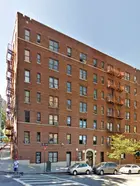So, if you’re parents happened be hanging out in the Lower East Side in the early 1980s long before the condo developers arrived, and they kept their apartment, they may be able to legally pass it on to you with its desirable rent still in place. Other immediate relations, including spouses and grandparents, can do the same. And because this is New York City, even chosen family can pass along rental units under some conditions, provided evidence of substantial “emotional and financial commitment and interdependence” is provided. But succession rights are never automatic, not even for children. In addition, no one can will a rent stabilized or rent controlled apartment to a child or other relation. In addition to being connected to the tenant, you’ll need to prove that you have also been living in their unit for at least two years prior to the tenant’s death or departure (one year if you’re disabled or 62 years of age or older).
In this article:
Succession rights defined
Simply put, succession rights determine one’s ability to be named as a new leaseholder on a relative’s rent controlled or rent stabilized unit. The rights are important since they ensure that families living in rent controlled and rent stabilized units aren’t evicted when leaseholders pass away or move out (e.g., because they require full-time care in a nursing home). While succession rights generally do work, if you’re hoping to take over a rent controlled or rent stabilized unit from a family member, it is still essential to understand how succession rights work in New York City.
Basic succession right regulations
As already noted, it’s typically possible for an individual who is already an occupant in a unit leased to a family member to become the legal tenant (succeed) after the primary tenant leaves. But this is contingent on having lived in the apartment for two years or more prior to the tenant’s departure, since the beginning of the tenancy, or since the commencement of the relationship. If the individual exercising his or her succession rights is disabled or 62 years of age or older, the co-occupancy requirement is reduced to one year.
As per Lead image via NYC Rent Guidelines Board, “The minimum periods of occupancy are not considered interrupted by military duty, enrollment as a full-time student, court ordered relocation (not involving the lease or grounds for eviction), temporary relocation because of employment, hospitalization or other reasonable grounds as determined by NYS Homes and Community Renewal (HCR) on application.” This means that if an individual grew up in a rent-stabilized unit but then left to attend university in Albany for two years and his or her parent died, they could theoretically still exercise their succession rights on their deceased parent’s unit.
Families of all kinds count
According to New York State, a “family member” can be a spouse, son, daughter, stepchild, parent, step-parent, sibling, grandfather, grandmother, grandson, granddaughter, father-in-law, mother-in-law, son-in-law or daughter-in-law of the tenant or permanent tenant. But these direct relations aren’t the only people who may count as family.
A New York State Fact Sheet on succession rights clarifies that “family member” may also include “any other person(s) residing with the tenant or permanent tenant in the housing accommodation as a primary resident, who can prove emotional and financial commitment and interdependence between such person(s) and the tenant.” In other words, you’ll need to be sharing a lot more than a frying pan and the occasional six-pack with your roommate to qualify. Courts consider the following factors when determining “emotional and financial commitment and interdependence” between tenants and other occupants:
- Longevity of the relationship;
- Sharing of household expenses;
- Intermingling of finances such as credit cards or bank accounts;
- Engaging in family type activities together;
- Formalizing legal obligations through such things as wills, powers of attorney, domestic partnership declarations etc.;
- Presenting as family members at public activities (e.g., if you grew up with someone you’re not related to but this individual used to attend the parent meetings at your high school, this would stand as evidence in this category);
- Regularly performing family functions for each other.
While counting anyone with whom one has an “emotional and financial commitment and interdependence” may appear to make succession rights murkier than they need to be, there are compelling reasons succession rights eventually came to account for all types of relations. For example, in the late 1980s to early 1990s, at the height of the AIDS crisis, hundreds of rent controlled and rent stabilized apartments were lost, mostly in Chelsea and the East Village. Unfair succession rights were largely to blame. As people died—and in New York City, thousands of people did—their rent-controlled and rent-stabilized units were often reclaimed by landlords and put back on the market at market rent. In some cases, this happened despite the fact that an intimate partner had been living on the premises with the primary tenant for years.
Claiming succession rights
Succession rights can only be claimed under two conditions: 1.) When a primary tenant dies; or 2.) When a tenant vacates the apartment. If and when that happens, the tenant claiming succession rights should send a certified letter to the owner. In the letter, they should indicate that the primary tenant has died or vacated the apartment for another reason and that he/she would like to sign the next renewal lease. If the request comes following a death, include a copy of the death certificate. Also, if you can’t easily prove you’re related, be prepared to provide evidence of your connection to the deceased or departed tenant. You’ll also need proof that you’ve been using the unit as your primary residence for more than two years (or one year if you’re disabled or at least 62). Official mail sent to the address (e.g., a cell phone or utility bill) should suffice, but be prepared—some owners will ask for substantial documentation. After all, if your close relation has been paying well under market rent for a unit in a coveted high-rent neighborhood, there is little incentive for the owner to facilitate the process. This, of course, is precisely why succession rights were established in the first place.







 6sqft delivers the latest on real estate, architecture, and design, straight from New York City.
6sqft delivers the latest on real estate, architecture, and design, straight from New York City.
